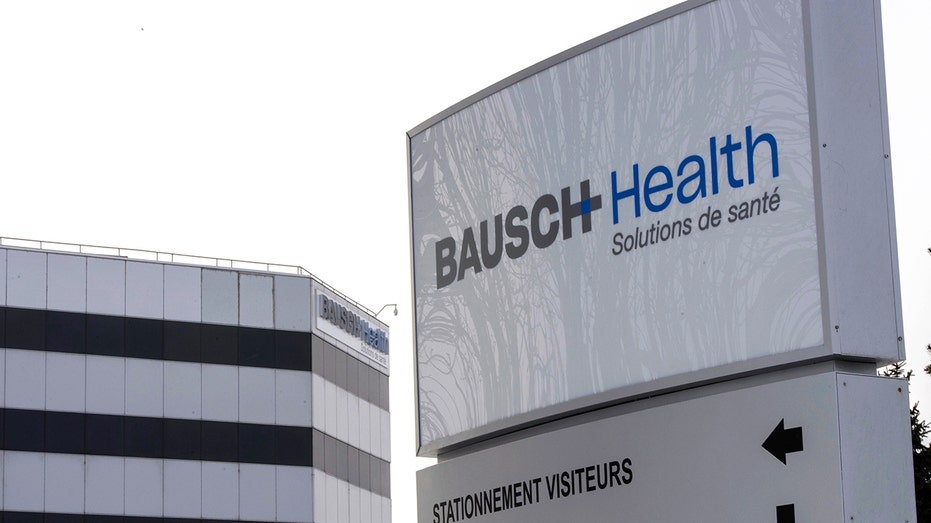Bausch Health to spin off eye-care business
The eye-care business would return to being a separate company
Bausch Health Cos. said Thursday it plans to spin off its faster-growing eye-care business from its core pharmaceutical operations, breaking apart a company previous management had built through such acquisitions.

This Wednesday, Feb. 20, 2019 photo shows, the headquarters of Bausch Health in Laval, Quebec. (Ryan Remiorz/The Canadian Press via AP) (Associated Press)
The eye-care unit, known as Bausch & Lomb, had $3.7 billion in revenue last year, compared with about $4.9 billion from the rest of the company.
The eye-care business would return to being a separate company, as it was before Valeant Pharmaceuticals International and its then-Chief Executive Michael Pearson acquired Bausch & Lomb for $8.7 billion in 2013.
| Ticker | Security | Last | Change | Change % |
|---|---|---|---|---|
| BHC | BAUSCH HEALTH COS. INC. | 5.98 | +0.10 | +1.70% |
Shares for Bausch rose more than 16% on Thursday on the news of the spinoff.
Thanks to such acquisitions, Valeant stock soared and the company became a Wall Street darling. But the firm later earned notoriety, and drew scrutiny, for aggressive drug-price increases and other business practices. Its stock plunged.
The spinoff plans, first reported by The Wall Street Journal earlier Thursday, would mark the latest hit to the Valeant legacy. Over the last several years, Canada-based Bausch has sought to climb out of the roughly $30 billion in debt accumulated through acquisitions and distance itself from past controversies, including dropping the Valeant name.
Chief Executive Joseph Papa has made strides remaking the business, some analysts say. He has divested about $4 billion of assets and paid down more than $8 billion debt, while launching new products like psoriasis medication Siliq and overhauling accounting and business practices.
"Now is the right time to begin the separation process," Mr. Papa told analysts on a call discussing the company's second-quarter earnings.
"We reflected on our portfolio. We said that 'we find ourselves with a portfolio of products that are somewhat an artifact of history that were put together through a number of acquisitions.' We said, 'what's the best way to get these portfolio of businesses to a place where we could grow these businesses,'" Mr. Papa said.
Recent efforts to revive sales, such as increased promotion of stomach drug Xifaxan, have paid off, but the company is forecast to grow slowly over the next few years, Cowen & Co. analysts have said.
The company is still saddled with about $24 billion in debt, and the stock price hasn't returned to the frothy days from several years ago. Activist hedge fund Glenview Capital Management LLC in late July said in a filing it controlled 5.9% of Bausch's shares.
STATE AGs LETTER URGING AVAILABILITY OF CORONAVIRUS DRUG SHOT DOWN BY HHS
Several drugmakers including Pfizer Inc. have sought to carve up their diversified businesses over the last several years, arguing that the moves create more focused companies that can produce better returns and be valued more readily by investors.
| Ticker | Security | Last | Change | Change % |
|---|---|---|---|---|
| PFE | PFIZER INC. | 27.05 | -0.17 | -0.62% |
Mr. Papa said that Bausch reviewed valuations of its eye-care rivals such as Alcon AG, and believes investors could see similar value with Bausch & Lomb as a stand-alone company. Alcon was spun out of Swiss drugmaker Novartis AG last year.
He said the spinoff could happen within the next 18 months but declined to specify a date.
Bausch & Lomb, founded in 1853, is one of the iconic names in eye care. The company invented Ray-Ban sunglasses for military pilots, and later introduced one of the first mass-produced soft contact lenses and among the first contact-lens solutions.
After accounting missteps and damaging recalls, private-equity firm Warburg Pincus LLC bought the company for $3.7 billion in 2007, taking it private.
Today, the business sells a variety of products, such as eye-surgery devices and contact lenses. More than half of Bausch's eye-care sales are from outside the U.S.
Before spinning off, the eye business will report as a separate segment of Bausch starting in the first quarter of 2021, the company said. Bausch hasn't decided the structure or closing date of the transaction, which will require board and regulatory approvals. It is in the process of determining management teams.
Under the plan, the other business will sell products including skin treatments like psoriasis therapy Duobrii, gastrointestinal drugs such as Xifaxan and the antidepressant Wellbutrin XL.
GET FOX BUSINESS ON THE GO BY CLICKING HERE
Last week, Bausch agreed to pay $45 million to resolve claims from the Securities and Exchange Commission that it improperly booked some revenue and misled investors about the impact of a 500% price increase for its diabetes drug Glumetza.
The SEC said three former executives, including Mr. Pearson, also agreed to pay penalties to settle the agency's claims against them.
In 2018, a former Valeant official, Gary Tanner, was found guilty of charges that he defrauded the company through a multimillion-dollar kickback scheme. Andrew Davenport, the former chief executive of a specialty mail-order pharmacy involved in the scheme was also found guilty.




















